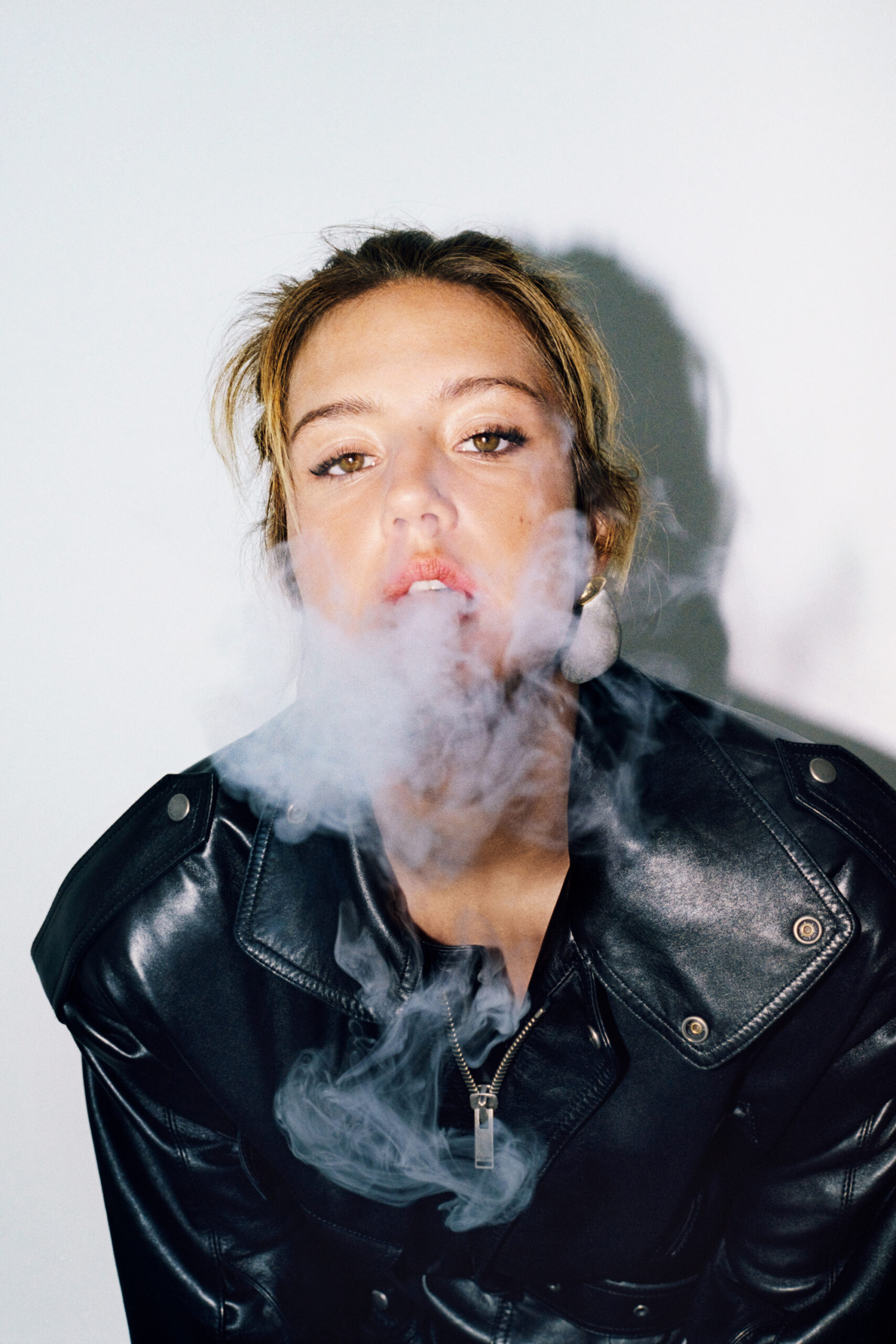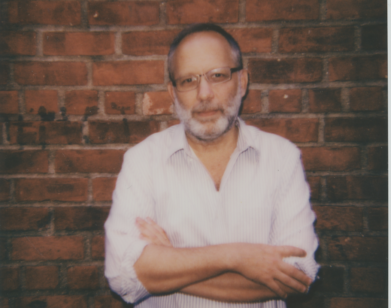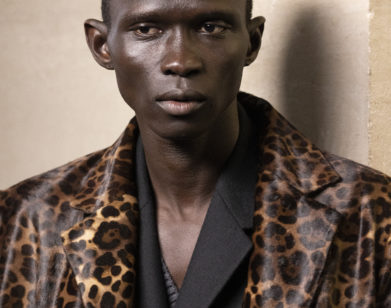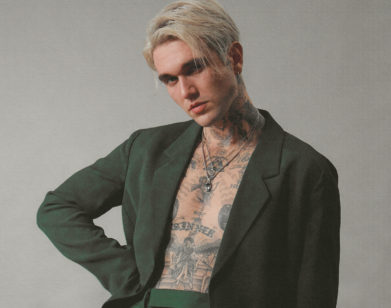CINEMA
Adèle Exarchopoulos and Isabelle Adjani on Rivals and Survival
Adèle Exarchopoulos first entered the public imagination when the racy, queer coming-of-age film Blue Is the Warmest Color won the Palme d’Or and made her both star and sex symbol. She spent the next few years adjusting to fame and reckoning with the movie’s controversial legacy while deepening her range in all sorts of projects, mostly in her native France. Her latest film, Passages, sees Exarchopoulous returning to the type of stormy, sexual romance that helped launch her career, but this time, as she tells the French movie star Isabelle Adjani, she’s battle-scarred and battle-ready.
———
WEDNESDAY 10 AM JULY 12, 2023 PARIS
ADÈLE EXARCHOPOULOS: Hello Isabelle. Can you hear me?
ISABELLE ADJANI: Yes, Adèle.
EXARCHOPOULOS: I think they’re using an app to record, as far as I know.
ADJANI: It’s a little like the FBI or the CIA.
EXARCHOPOULOS: Yeah. How are you doing?
ADJANI: Not so bad, and you?
EXARCHOPOULOS: I’m fine. I’m with some friends and our children on vacation.
ADJANI: You have a 5 or 6-year-old, right?
EXARCHOPOULOS: Yeah, I’ve got a 6-year-old boy. How old are your kids?
ADJANI: The youngest is 28, so—
EXARCHOPOULOS: I see, little men.
ADJANI: Are we supposed to wait for someone to log on? I thought there was a moderator.
EXARCHOPOULOS: I called using the app, but I think it’s just recorded that way.
ADJANI: Okay. It’s just between us. By the way, I didn’t prepare anything as if I were a journalist. I am an actress.
EXARCHOPOULOS: Obviously.
ADJANI: I did two covers for Interview. The last one was for Camille Claudel, and the other was a very long time ago. For me, it was a kind of incredible prestige. Because when you’re 20 and you’re in Andy Warhol’s magazine, it’s a very powerful thing to experience. I wanted to know if Interview had a place in your imagination.
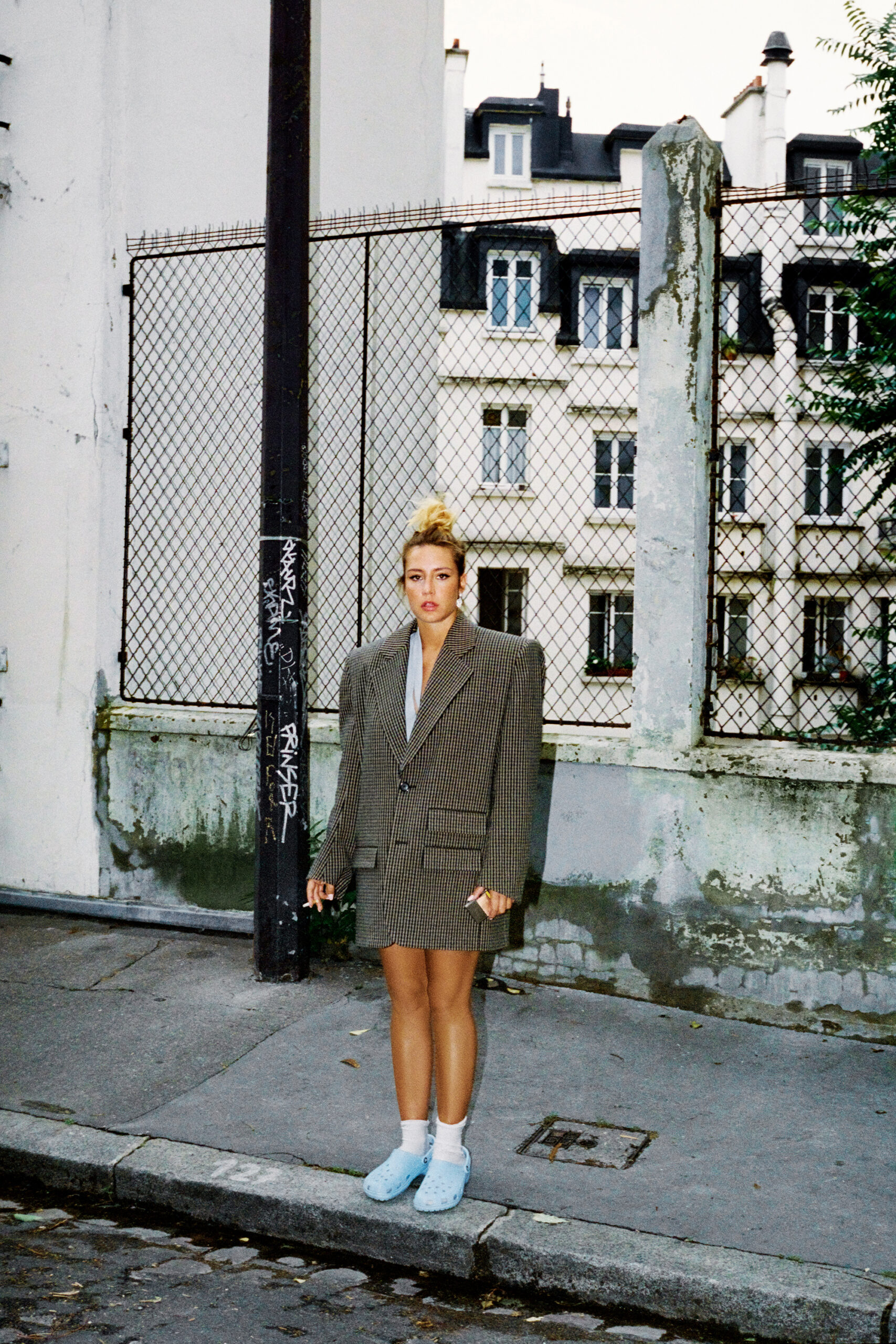
Blazer Saint Laurent by Anthony Vaccarello, Sweater Fendi, Earrings Bvlgari, Socks (worn throughout) Stylist’s Own, Shoes (worn throughout) Crocs
EXARCHOPOULOS: To be honest, it almost felt like too much, and even more so when I found out it was you, because that’s rare.
ADJANI: Me? I’m just the one imported into this mix. I wanted to know if Andy Warhol exists as an artist, a visionary, in your imagination. Does he occupy a place in your life?
EXARCHOPOULOS: I think he’s one of those people you have to admire. He conveys a strong sense of freedom. I like the candor.
ADJANI: I only met him briefly. He was very shy, and I was intimidated by his shyness. But I did run into him in New York, and I have a photo that we’re both in. I think he would have liked you a lot, because he liked actresses who went beyond acting, or weren’t exactly actresses. I’m not going to call them creatures, because that might sound a little pejorative and superficial.
EXARCHOPOULOS: No, but it’s—
ADJANI: Creative forces that turn a person into a creature. So when this person walks into a room, the energy of the room changes. Warhol had extraordinary antennae and he would have jibed with you, because you have this unique charisma. I find that very, very rare, but you’ve got it. There’s something powerful and in sync about your presence.
EXARCHOPOULOS: I’m not really aware of what I’m giving off. Like, for example, you read an interview with yourself, and you say, “Oh, people see me like that?” It’s something between fantasy and projection—
ADJANI: I know. It’s like a cat. A cat doesn’t think, “Oh my, I’ve got a feline way of walking, isn’t that great?” But you have that. Is this interview about your whole career? Or does it have to do with the release of Passages in particular?
EXARCHOPOULOS: It’s a bit of both. The occasion is the release of this film I made with Ira [Sachs, the director of Passages]. He was working on a project in the United States and the lockdown meant that he had to rethink things and shoot in France, where we met. He talked to me about these two actors, Ben Whishaw and Franz Rogowski, and wanted to make a kind of love triangle between a gay couple, who out of boredom and curiosity, begin having a relationship with a woman. I’m really extraneous to their relationship and at the same time I also have feelings. I play a young teacher who falls in love with one of them. I have to admit that I never tire of love stories, either in my own life or in films. And there’s something very gentle and nonjudgmental about Ira. It’s rare these days for people not to judge either their characters or the people they meet, and I find that very touching.
ADJANI: Do you prefer to shoot with directors that have an unconventional approach, either in the way they help you develop your character or prepare a scene?
EXARCHOPOULOS: I was very influenced by one of my first film experiences with Abdellatif Kechiche [the director of Blue Is the Warmest Color]. The shoot lasted eight months, and there was some controversy behind it, but what I remember in terms of the set was an immense freedom of improvisation. I was arriving from a classic school with normal codes, and I was lost! Normalcy was reversed, and I told myself, “Well, I’m not going to make it. I’m face to face with real cinema.”
ADJANI: Real cinema! [Laughs]
EXARCHOPOULOS: I’ve managed to adapt to it, but the script already informs me a lot about [a director] and how they want to tell their story. I like people who aren’t trying to win you over, who defend their character and the honor of their story above all else. I now adapt very quickly when I’m on a set. After working with Abdellatif, I felt a bit lost, but at the same time, I was immediately given opportunities that I’d never been given before.
ADJANI: What strikes me in what you’re saying is that you think of yourself as very malleable and adaptable; you’re a kind of emotional contortionist. I often wonder, when a person is an actress, if they’re capable of overcoming everything that’s inflicted on them. For example, you made that film with Abdellatif Kechiche, which was, as you say, very controversial, and there was also an acknowledgment of pronounced trauma for the two actresses in question [Léa Seydoux and Exarchopoulos], and I wonder how you recovered from that? I remember—if you’ll allow me to offer a comparison from my own career and some situations with [the director] Andrzej Żuławski—there was something of great violence that I agreed to take on. But I’ve realized over the years that it’s something I could never accept again, and it’s part of everything that my subconscious has been swallowing and incubating. I wonder if acting has been a bit unhealthy during certain periods of my life, no?
EXARCHOPOULOS: Right.
ADJANI: I consider myself a survivor for a lot of reasons. So, I was wondering if you see yourself as a survivor too, as someone who brings her life into her work.
EXARCHOPOULOS: Of course. With Abdel, at the end of Blue Is the Warmest Color, he could clap his hands and I would cry. I don’t know how to explain it. It was completely linked to my emotional makeup. And yet there was no fear or terror. For six straight months, we were sharply in the middle of things, and well, there was something to do with exhaustion and the unconscious. I think you’ve had to go through that too, with the roles you’ve had.
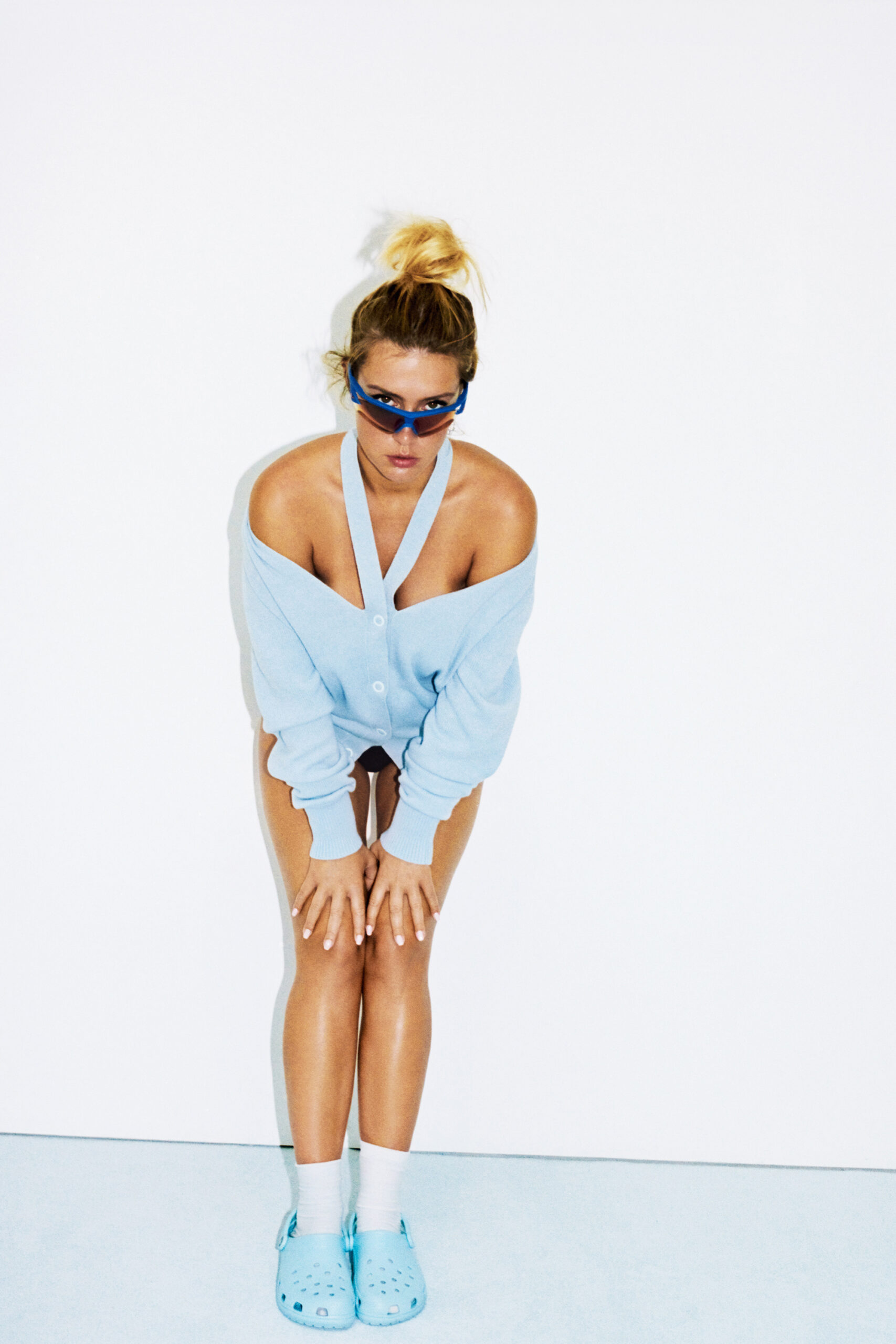
Sweater Fendi, Underwear La Perla, Sunglasses Puma
ADJANI: Of course.
EXARCHOPOULOS: It’s very hard for me, when someone tells me I have to cry. I’m a very empathetic person, as are my parents. But I need to really understand the character, and sometimes that heartbreak really affects me. Sometimes characters are like friends for whom I’d have a lot of empathy. It’s shitty actually.
ADJANI: What’s beautiful is to make a place within yourself for a character, without that character turning into a negative entity, but sometimes your life gets blown apart like that. Great actresses have been devoured from the inside. It’s a kind of self-cannibalism. And that’s what I find so beautiful about you, is that you have a fervor, a spontaneity, a life force. I read in an interview that you live in the same building as one of your best friends you made through the Canal+ series. I’ve always been a loner, probably as a result of my own doing, and I really envy that. This ability to live with people, I’ve never experienced that.
EXARCHOPOULOS: Really?
ADJANI: No, not at all. I’m always on my own. But friendship is very important.
EXARCHOPOULOS: In the end, I think the difference is that I’m an actress, and you, beyond being an actress, are an icon. And whether you like it or not, because it doesn’t come from you, and it’s not a choice, it must have distorted your relationships. There’s something that goes beyond you, something you represent and embody. I remember when I watched La Reine Margot, I paused the film and said to myself, “I’ve never seen anyone like that in my life.” And I believe that, whether you like it or not, there’s a connection that it has with the other humans you come into contact with. But I have to admit that I’m lucky, friendship is a big part of my life.
ADJANI: Yes, it’s magnificent.
EXARCHOPOULOS: It works because we tell one another the truth a lot. My friends can tell me about my work or my life choices, and they know that as long as there’s good will, they can tell me, “You’re making a very bad choice,” or, “I don’t recognize you,” or, “You should be careful.”
ADJANI: That’s great. But this is a generation of mutualism, and that’s something I haven’t experienced. My generation was one of rivalry. I wish I were 30 today. I’d feel more like myself.
EXARCHOPOULOS: That, I understand. I also think there’s no specific age for meeting great friends. But I’m a little old-fashioned in the way I see things. Today, the way people consume things in general, whether it’s love, sex, or work, is quite disconcerting when you’re a little sensitive. And that, I know, is very much part of our online generation.
ADJANI: I have a great fear of social networks. My youngest son, he’s completely unsubscribed from social networks. He no longer has Instagram and all that. It’s a relief. As a mother, I think to myself, “Wow, he’s escaping this tyranny of staging his personality.” By the way, I saw in an interview that you said you didn’t want to take your son to shoots. You didn’t want him to know what you were doing.
EXARCHOPOULOS: I didn’t lie to him, but I did tell him a story for a long time. That is, when they were taking photos of me in the street, he’d say to me, “But who are these people?” I’d say, “They’re my friends.” I didn’t know them at all. I see the dangers of this environment, I see the loneliness it can create for certain artists, and I see the disconnection above all. My son isn’t an aspiring actor, but my relationship with acting used to make me very anxious. I used to say to him, “Mom tells stories to grown-ups, that’s all, but it’s never going to be our story.” And then, at some point, he understood. To be perfectly honest with you, I had to justify my absences. One day, I said to myself, “Wait, he has to know that I love what I do, that it’s important.” So I started explaining to him that I play characters and that sometimes people get attached to these characters, but I don’t take him to set. The first set I took him to while I was shooting was Mélanie Laurent’s film [Wingwomen], because I thought he’d laugh at the explosions. Mélanie, who’s very sweet, said to him,“Do you want to come with me and watch Mommy on the screen?” He said, “No, I’m going to the park.” I was so happy.
ADJANI: I had the same fears with my sons. I was afraid of an imbalance. And then there’s the incomprehension of a child seeing his mother put herself into emotional states that don’t correspond with what she wants in real life. It’s a real dilemma, being absent and so dedicated to it. My sons reproached me for it. It was resolved, but there was always, “You weren’t there.” And that’s horrible.
EXARCHOPOULOS: Yeah, it’s tough.
ADJANI: They know they’re being a bit unfair when they do that, but we’ve made a choice and we’re not going to pretend we haven’t. And that’s that.
EXARCHOPOULOS: Film kind of happened to me, I didn’t really expect it. I didn’t know anything about that world, but somehow it fell into my lap. Lately, I’ve been working a lot with people I love, and I’ve had one chance after another, but at the same time, I’m thinking to myself, “There are people who pray all their lives to have what I have today, and at the same time, I feel a visceral lack of the mundane.” I need those moments of banality when I pick up my son from school, or when I’m at the bank.
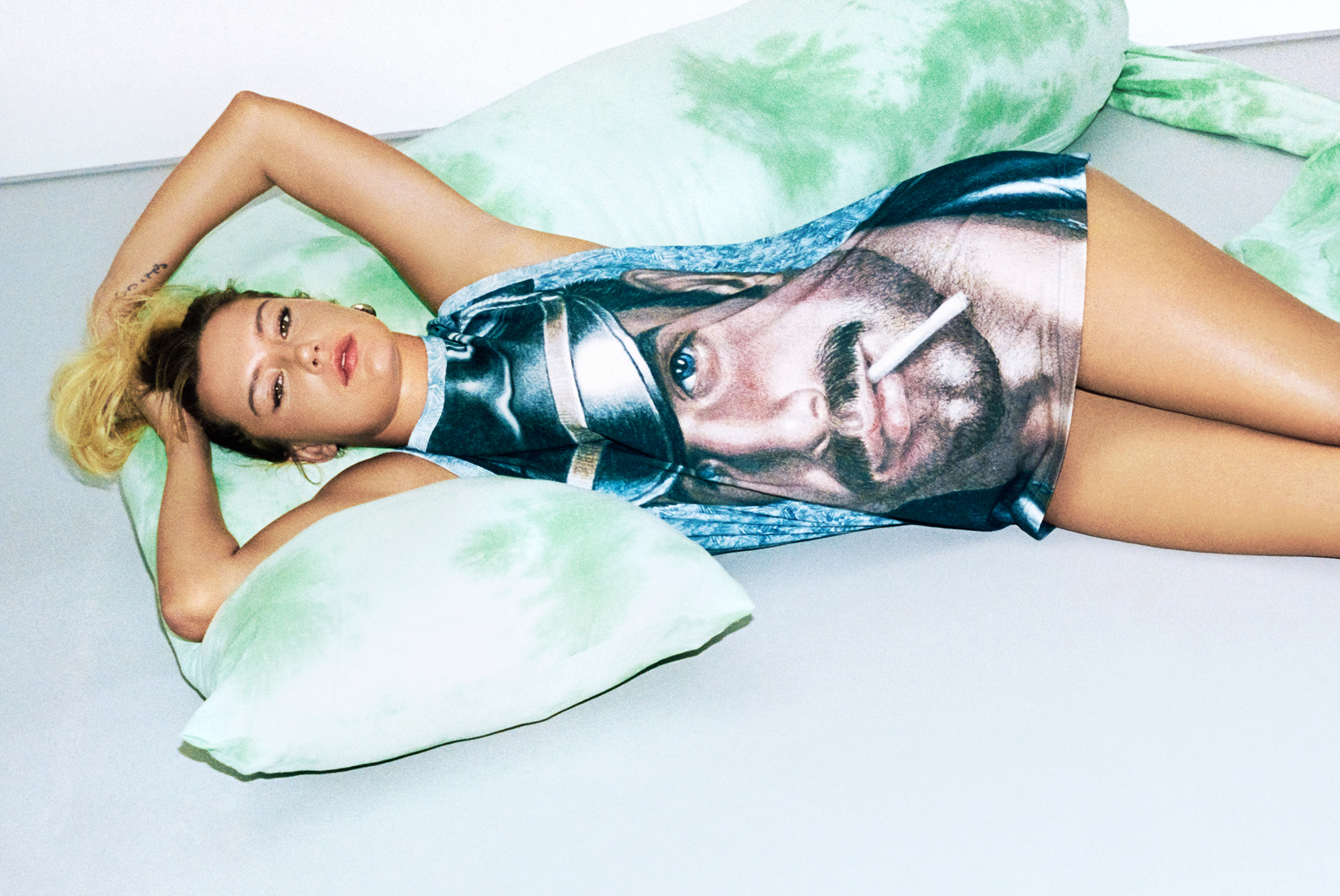
Shirt Diesel, Earring Gucci
ADJANI: I made it so I wouldn’t have to work all the time, and I was criticized for it. They said, “Why don’t you make more films?” It was because my parents were ill and needed me, and my children needed me. I even forgot that I was an actress at certain times. But that, too, isn’t forgiven. Basically, there’s no way out.
EXARCHOPOULOS: Yeah, but at the same time, I like mystery in someone, especially in an actress. We’ve all had an overdose of someone we see too much of. I love not having all the answers from someone, especially someone who has many faces, many emotions.
ADJANI: Of course.
EXARCHOPOULOS: It’s a job where you can quickly accumulate a lot of regrets, and I’m not made for regrets.
ADJANI: It’s not a job that facilitates a happy frame of mind, quite the opposite. That’s why it’s important to be surrounded by friends who can be angels, but also conscientious objectors. Otherwise, you can lose yourself.
EXARCHOPOULOS: Of course.
ADJANI: I love Wingwomen. Mélanie Laurent is one of my favorite directors ever, and I was so sad not to have any real scenes with you.
EXARCHOPOULOS: I was disappointed not to be shooting with you, too.
ADJANI: Ira said you’re a mixture of [Brigitte] Bardot and Jeanne Moreau, but also, you remind me of my cats. I have one cat that’s an Egyptian Mau, it’s a sublime breed of cat, and the other one I got off the street. She’s a kind of savage, on the lookout for everything, but with an incredible vivacity. But I loved what you were doing in Wingwomen, you were a wildly unleashed sniper.
EXARCHOPOULOS: I had fun, even though someone broke my nose. It’s still not straight. I had the operation the next day, but in real life if you look very closely from the front, it still goes a little to the right.
ADJANI: I’m sure it’ll heal. But I think you’re nutty in this film. Anyway, I feel the same about all of your films. Thank god I haven’t seen them all. I’m glad there’s still things to see. You like all of your films, don’t you?
EXARCHOPOULOS: I love them, plus I’d really like to work together. I love All Your Faces—I laughed at that—and I love Zero Fucks Given. The last two.
ADJANI: There you go. Jeanne Herry is an extraordinary director. I’ll get to see Zero Fucks Given.
EXARCHOPOULOS: Thank you for doing this. Let’s have dinner with Mélanie soon.
ADJANI: I’d love to. Many kisses.
EXARCHOPOULOS: I’m sending you a big hug.
ADJANI: Me too. Bye-bye Adèle.
—Translation by Bruce Benderson
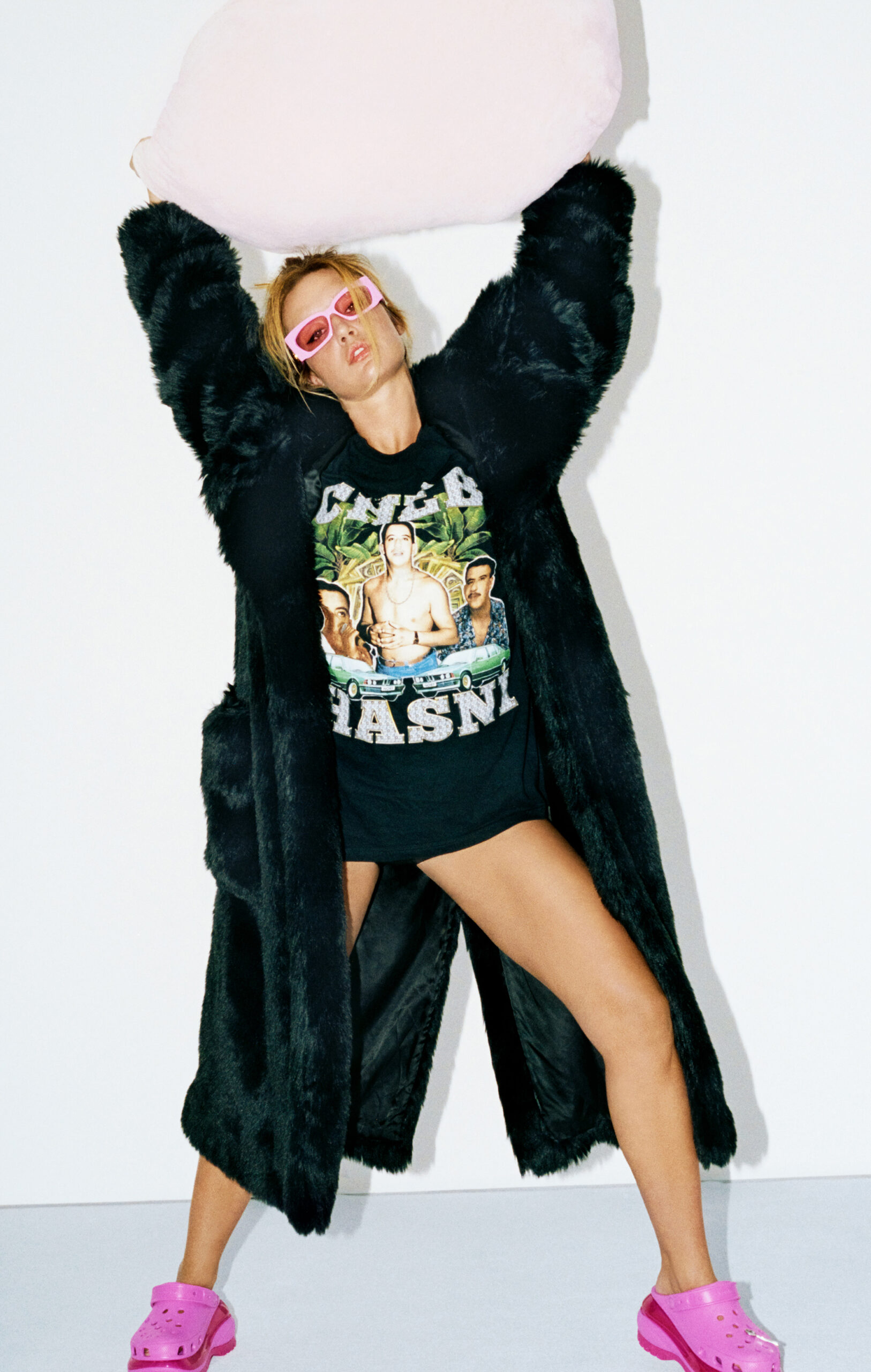
Coat Givenchy, Shirt Adele’s Own, Sunglasses Gucci, Underwear La Perla
Hair: Alexander Soltermann using Oribe at Home Agency.
Makeup: Satoko Watanabe using Charlotte Tilbury at Artlist Paris.
Nails: Fanny Santa Rita at Call My Agent.
Studio Manager: Lukas Lake.
Photography Assistant: Alexandre Levouadec.
Fashion Assistant: Manon Kutner.
*This story was completed before the SAG-Aftra strike.

